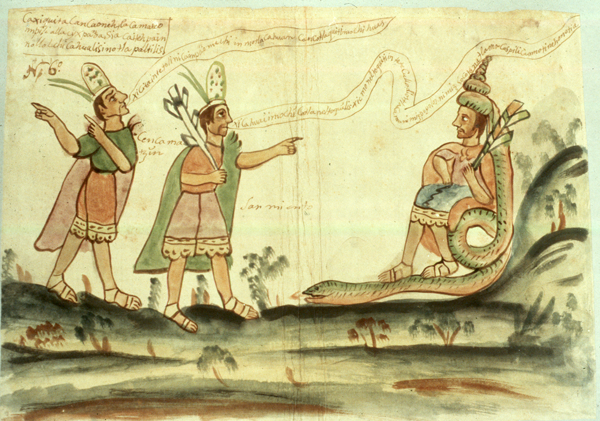full view, Scene 6
Here the four principal figures of this manuscript, the indigenous nobles Tepoztecatzin, Sarmiento, Cencamatzin, and Cacalotl, have traveled to greet Hernando Cortes and his men, who have just left the pueblo of Jalapa, in the East, and are marching toward Mexico City. The greeting party agrees to guide the Spaniards on the road [Stephanie Wood ©2003]
"Here subjected himself to me that powerful monarch in whose presence no one would ever have passed, had I not done so by my valor and boldness. I am Cacalotlzin. I am named Sarmiento. I am named Cencamatzin. Abandon idolatry, believe in God, otherwise I will destroy you, I will break you in pieces, oh, Tlamacoxpili, who art carried by a green snake: thou dost not instill fear in me. See the misfortunes and disasters, which thy vassals suffer on thy account."
[Frederick Starr's English translation of the text found in the corresponding scene in the version he saw in the pueblo in 1898, published in his The Mapa de Cuauhtlantzinco (Chicago: University of Chicago Press, 1898), p. 13]
Starr's footnote: "Notice particularly the gesturing; the two chiefs are speaking as truly by gestures as by words. They appear to be Cacalotzin and Sarmiento; Cencama perhaps follows the latter. Tlamacoxpili is represented upon his great snake: its head and forward body are stretched out below his feet, the middle part is thrown into a coil and serves as a seat, while the hinder body passes up behind the back and coil into a conical crown upon the ruler’s head. Wands of wood with branches, in the hands of Cacalotl and Tlamacoxpili are clearly scepters of insignia of authority." [p. 13]
Note how the speeches are all in the first person, with the various leaders from Cuautlancingo having a chance to speak. One could imagine these being lines from a religious play.
